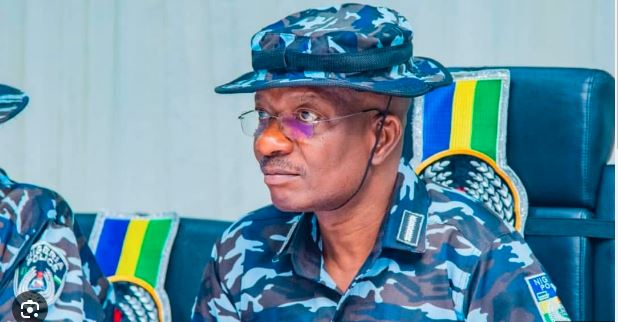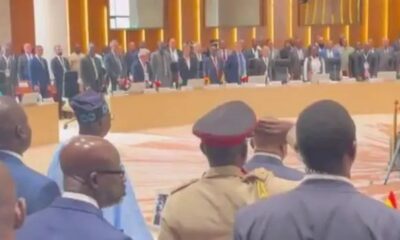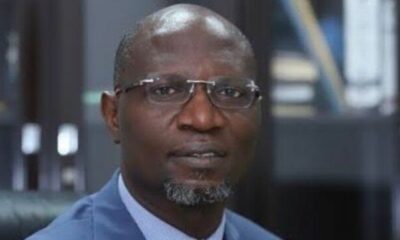Top Story
FG roads: Wike eyes project refund, Tinubu replies “I owe you nothing”
…Says “you have to lobby me to collect it”
…We are entitled to refund — Wike
…Says refund will encourage other states to intervene on critical FG projects
…As ‘no refund’ policy subsists
Demands placed by Rivers State Governor, Mr. Nyesom Wike hoping for a refund from the incoming Federal Government to be led by President-elect, Asiwaju Bola Tinubu over federal road projects executed by his government, were apparently turned down as Tinubu made a shocking comment saying “I owe you nothing.”
Wike’s request came on the heels of expectations for a refund for the construction of some federal roads which the State executed.
Recall Rivers is one with four other States of Cross River, Ondo, Bayelsa and Osun which claims for refunds over projects done on federal roads were rejected in 2020 on grounds that they did not establish proper documentation to warrant a refund.
The Federal Government had consequently since 2020 stopped the refund policy, citing issues of fouls play.
Wike who played host to the President-elect as the special guest for the commissioning of the Rumuokwuta-Rumuola Flyover in Obio/Akpor Local Government Area of Rivers State on Wednesday, mentioned how the State had to amend its procurement law to enable it source funds for various projects executed and completed in record time, noting that road projects within the purview of the Federal Government were undertaken by the State, using its resources.
“And unfortunately too, these projects ought to be Federal Government projects because they are federal roads.
“If we had said because they are Federal Government roads, and we won’t do it. Who are those to suffer?
“Since we have said we don’t want our people to suffer, I also believe that the Federal Government should say look, you have done well for us. These are projects we should be doing, can you bring your bill, let us refund you the money, you have done these roads.
“That is what it is supposed to be for a partnership with a good Federal Government. I can assure you as you enter the office and you approve to pay this money back, other States will have the courage to also do the same thing.
“I am not asking what we are not entitled to. The Federal Government should say you are a true son of this government you have removed shame from us,” Wike demanded.
However in an apparent shocking response, the President-elect though acknowledged the projects, yet said he owes the State “nothing,” saying it is Rivers people “living on the road.”
“The 12th flyover and the demand you made for refund, I owe you nothing. It is your road.
“You can’t chuckle at me and make a demand. You are the one living on this road. I commend your effort. You have to lobby me to collect it,” he said.
Tinubu who recounted he went through what he described as a “gruesome campaign” to win the 2023 presidential election, however promised he would leave no part of the country marginalised.
“I went through a gruesome campaign, fought hard, supported by many of you, and I won,” he said.
“I will leave legacy projects across the length and breadth of Nigeria. I will never forget the pivotal role the great and wonderful people of this State (Rivers) played in my victorious campaign to become the next President of this country. You have my eternal gratitude.
“In his excellency, Governor Wike, I see a man of principle. He took a principled stand that the presidency should be returned to the South; and he had the courage to stand by his convictions, not minding whose ox was gored.
“He is, indeed, a man of great integrity. He did not choose to serve his own interests, but rather, the interests of the nation and the people of Rivers State. I thank him for his selfless leadership,” he said.
Wike had on the heels of playing host to the President-elect for commissioning of the project declared a public holiday for the State, though the development generated knocks and mixed reactions.
Recall that the Federal Government had in June 2020 cancelled the refund policy where the Federal Government refund State Governments for projects executed with State funds on behalf of the Federal Government.
Citing issues of foul play and controversial demands, the Federal Government had also required any State willing to execute project on federal roads without the intention of repayment must equally seek its permission for supervision by the Federal Ministry of Works and Housing.
On the development, the Minister of Information and Culture, Lai Mohammed, had after the third virtual cabinet meeting chaired by President Muhammadu Buhari in 2020, said the FEC had approved the refund of N148.1 billion to five States spent on federal roads because of the new guidelines.
The refund had included N18.3 billion to Cross River, N7.8b to Ondo, N2.4billion to Osun, N38billlion to Bayelsa and N78.9billion to Rivers.
Mohammed had said over N500 billion had earlier been paid to 31 States.
“You will recall that in 2016, 36 States of the Federation sent a very huge bill to the Federal Government, asking for compensation for money that they have expended on federal roads.
“This prompted Mr President to set up a committee to go and verify the claims of these 36 states, whether indeed these projects were actually constructed and completed in line with the Federal Government standards.
“At the end of that exercise by an inter-ministerial committee, chaired by the honorable Minister of Works and Housing but also had Ministers of Education, Transportation, Finance, Minister of State for Works, DG BPP and Permanent Secretary, Cabinet Office as members.
“At the end of that exercise, the committee recommended that the Federal Government should refund N550,364,297.31 billion to 31 of the 36 States, after they were convinced that, yes indeed, the projects were completed and there were Federal Government roads.
“But the claims of five other States, Cross River, Rivers, Ondo, Bayelsa and Osun failed on the grounds that they did not do proper documentation and the committee felt they needed proper documentation,” he had said.
The Minister had added that the committees confirmed the roads and the bridges built about 10 years ago were not only completed but also in substantially good form.
“There is a caveat, the Federal Government will pay the states, however, henceforth, if any State takes on Federal Government road, it will not be paid, they will not get any refund.
“Even if you want to pay from your own pocket, you will still need the permission of the Federal Government and it will be supervised by the Federal Ministry of Works and Housing,” he had disclosed.
Top Story
State Police: Nigeria immature for implementation, will be abused by Governors — IGP


…As Fmr President Jonathan, Abdusalam harp on independence of Police, increased funding
By Adeyanju Esther
The Inspector General of Police (IGP), Kayode Egbetokun has stated that Nigeria is immature to have a state controlled Police force.
The IGP was responding to recent calls advocating for the creation of State Police to tackle the rising insecurity and banditry across the country.
Recall that some state Governors had previously embarked on creating security services but have been unsuccessful on making them legally recognised, prominent of which is the Amotekun Corps set up by South-West Governors.
Speaking during a national dialogue on state police organised by the House of Representatives in Abuja, with the theme: ‘Pathways to Peace: Reimagining Policing in Nigeria,’ Egbetokun, represented by Ben Okolo, an assistant inspector-general of police, said Nigeria is not ready for a decentralised police force.
He said, “It is the submission of the leadership of the Nigeria police force that Nigeria is yet to mature for the establishment of state-controlled police.”
The IGP listed some of the challenges as inadequate manpower, inadequate operational equipment such as vehicles, arms and ammunition, communication equipment, drones, aerial surveillance cameras, security surveillance helicopters, armoured vehicles, and inadequate training of personnel.
He added that state police would create a conflict of jurisdiction and be open to abuse by state governors.
However, Minister of Police Affairs, Ibrahim Gaidam, countered Egbetokun’s stance with advocacy for state police. Gaidam argued that decentralising the police force was imperative to effectively combat the rising tide of insecurity. He stressed the need for tailored, localized approaches to policing to address the diverse security challenges facing different regions of Nigeria.
However, concerns were raised about the potential of such a merger as proposed by Egbetokun on the autonomy and efficacy of the respective organizations.
Also speaking, Former President of Nigeria, Goodwick Jonathan declared that the issue of state police is non-negotiable.
Jonathan noted that for state police to be implemented, the Independent National Electoral Commission (INEC) must be rejigged.
“So if we are talking about state police, we must also rejig INEC, and the police must not be used against or to the advantage of any political party.
“The issue of voting, the polling booths of INEC, and the use of police during elections has to be reviewed by the National Assembly.
“So the National Assembly needs to look into all these. These are the areas that we have to concentrate on. The issue of the need for states to have their own police is not negotiable. There is no way we can continue this kidnapping that is going on in this country,” Jonathan said.
Former Head of State, General Abdulsalam Abubakar (retd) also rechoed the opinions of Former President Jonathan.
Abdulsalam opined that the success of the state police is hinged on adequate funding.
He said that in order to make peace and security in any nation, the governance must be transparent, must have honesty, accountability and all that it takes to make citizens comfortable in order to go on with their daily business to earn their legitimate earnings.
He added that the citizens of any country have the responsibility and that responsibility is to ensure the maintenance of peace and order and this can be done by upholding the Constitution, laws and orders, and regulations.
“Not only that, citizens should not vandalise any property or establishment provided by the various governments. It is our responsibility to be each other’s keepers and ensure that there is equity and the maintenance of issues provided by the various governments,” Abubakar said.
He further called that the traditional rulers should be carried along in achieving that state police.
“Indeed, our royal fathers have a lot of responsibilities in ensuring the maintenance of peace and order. As a young child growing up in a rural community, we see the role of these royal fathers in the various arms ‘of their governments,’ where when a stranger enters a village, within hours, the village head knows about that stranger and through their means of communication, the Emir is aware,” the ex-Head of State said.
“I think, as much as we are talking of establishing State Police, we should also look into the role vis-a-vis our royal fathers.
“President Jonathan has mentioned the relationship of what I was to say to politicians vis-a-vis the local police if we decide to have them. It is absolutely necessary for the politicians as much as possible to avoid exerting influence on the ways the police are going to operate if at all we agree to have the police.
“Although President Jonathan has already concluded that it’s the operational standards that we are going to discuss. I think we must really give it a thought to have to operationalise these police if we decide to have them,” AbdulSalam said.
In the same vein, Vice President, Kashim Shettima pledged the commitment of the President Bola Ahmed Tinubu’s administration to reform the Police Force and enhance security to achieve a safer and more secured Nigeria for the well being of citizens.
According to him, Tinubu believes that the path to effective security is through adaptive reforms catering to Nigeria’s diverse circumstances.
This, he said, can only be achieved by carefully reviewing various options in the Nigerian context. He said this inclusive approach will guide the country to have a policing system that is most effective and respectful.
“Your interest in the issue of state policing underscores your commitment to the security and well-being of citizens. This initiative is not only timely but also speaks to the commitment of the legislative arm for addressing critical national issues through inclusive and collaborative governance,” Shettima said.
“This government under the leadership of President Bola Ahmed Tinubu is actively aware of the complex security issues that abound in places.
“As such, we are continually developing and reminding ourselves of methods to address these challenges effectively. Today’s dialogue is critical to these efforts of providing a platform for robust discussion and innovative thinking regarding the reform of our policing structure. He deserves commendation for his openness and proactive stance towards the idea of reforming and decentralising the police force.
“It gladdens my heart that the 10th House of Representatives under the Speaker Tajudeen Abbas has keyed into this initiative. The involvement of the legislature in executive reforms ensure continuity and synergy. Let us use this opportunity to engage with the seriousness it demands.
“The President is committed to listening to your recommendations and insights invariably to share in the policies that would lead us to a more secure and good society.”
He further explained that the concept of state policing is not merely a policy but a potential revolution of the law enforcement framework which offers the possibility of catering to the diverse means of the nation’s communities.
“As the Vice President, I am deeply interested in the outcomes of today’s discussions. The insights would inform our administration’s approach to supporting legislation and enhancing the capacity of our police force but also strengthen the bonds of trust between the law enforcement and the public.”
“In our deliberations, let us consider the implications of state policing from multiple perspectives. We must invite (stakeholders)…to respond on time to emergencies, adapt to specific local challenges and increase accountability. At the same time we must address concerns related to the standardisation of training, oversight and the safeguarding of our civil liberties.
“We should also see it as an opportunity to listen, understand and focus on the solutions. It is essential that this forum is not the end but the beginning of an ongoing conversation on the issue of police and security sector reform in our country.
“The nature of the stakeholders gathered here today including security experts, religious leaders, civil society representatives, underscores the comprehensive approach to ensure that diverse perspectives are integrated into the policy making process.
“As we continue today’s sessions I urge participants to engage with openness, honesty and insight. The value of this gathering lies in the ability to harness advice and constructive reasoning and suggestions from all quarters. Your contributions today are not merely academic but theoretical discussions of the transformative reforms we aspire to implement.”
He also reiterated the President’s readiness to support and implement meaningful resolutions that would emerge from the dialogue.
Top Story
Gunmen kill Babcock lecturer, abduct two in Iperu


Gunmen have murdered a lecturer from Babcock University Ilisan Remo, Yinka Olowojobi.
The gunmen numbering about eight were said to have invaded Ajadeh Event Centre in Iperu Remo along Sagamu road also abducted two other persons.
The incident, according to a statement from the Spokesperson of Ogun State Police Command, Omolola Odutola, on Monday, happened on Friday, April 19 at about 9:20 pm.
The gunmen were said to have shot Olowojobi in the chest after allegedly resisting to go with them.
The slain Babcock University lecturer alongside one Dare and another person yet to be identified who were abducted were said to be relaxing in the lounge of the event centre when the daredevil gang struck.
Odutola, however, said that the police had picked up one Awada Ishaya from Plateau State as a suspect in the act.
Ishaya was said to have just been employed two weeks ago as a security guard when the event centre was opened.
The statement reads, “A report from the Iperu Division indicates that a kidnapping and murder incident occurred on April 19th, 2024, at about 9:20 pm.
“It was reported that gunshots were heard at the Ajadeh Event Centre on Sagamu Road in the Iperu area in Ogun State.
“Eyewitnesses were able to count eight men dressed in black and armed with guns emerged from an unknown place into the relaxing lounge and open fire indiscriminately, where one person later identified as a lecturer at Babcock University named Olowojobi Yinka, was shot in the chest, for resisting to go away with the hoodlum, at their prompt, while a manager of a car stand, simply known as Dare ‘m’ the third person is yet to be identified.
“A suspicious coincidence led the police to arrest one Awada Ishaya ‘m’ of Plateau State who was employed two weeks ago when the event centre was launched as a security man for further interrogation.
“The lecturer was taken to Babcock University Teaching Hospital, where he was pronounced dead.
“Efforts are underway to apprehend the culprits and rescue the kidnapped victims. Further updates will be provided as the situation develops.”
Top Story
Power devolution: NERC cedes regulatory powers over Enugu to State government


In a groundbreaking move, the Nigerian Electricity Regulatory Commission (NERC) has ceded its regulatory powers of the Enugu electricity market to the Enugu Electricity Regulatory Commission (EERC), which is owned by the state government with effect from May 1, 2024.
This is the first-ever transfer of regulatory powers from the NERC to a state government electricity regulator.
This strategic shift was detailed in a memo released by NERC, bearing signatures from its Chairman, Sanusi Garba, and Commissioner for Legal, Licensing, and Compliance, Dafe Akpeneye, dated April 22, 2024.
The transfer is a direct result of recent legislative changes that have decentralised the power sector.
These changes were set into motion in March 2023 when former President Muhammadu Buhari signed amendments to Nigeria’s constitution that removed power generation, transmission, and distribution from the exclusive legislative list, effectively ending the federal government’s sole jurisdiction over these areas.
Under the new legal framework established by the Electricity Act 2023, states now have the authority to manage and regulate their electricity markets.
The amended Paragraph 14(b) Part II of the Second Schedule to the 1999 Constitution empowers state governments to legislate on electricity provision within their territories.
According to NERC, the Enugu Electricity Regulatory Commission (EERC) now holds the exclusive authority to set and adopt end-user electricity tariffs within Enugu State, tailoring these charges to local conditions and requirements.
While EERC manages local tariff methodologies, any electricity sourced from grid-connected plants and the related tariffs for generation and transmission services must still receive approval from the Nigerian Electricity Regulatory Commission (NERC), ensuring alignment with national energy policies.
Ultimately, the final tariffs approved by EERC for consumers in Enugu will be definitive for the state, with the Enugu State Government responsible for supporting and implementing tariff-related policies, ensuring that electricity pricing is both fair and attuned to the specific needs of the state’s residents.
The memo from NERC states, “This regulatory instrument may be cited as the Order of Transfer of Regulatory Oversight of the Electricity Market in Enugu State from NERC to the Enugu State Electricity Regulatory Commission (EERC). This Order shall take effect from May 1, 2024.”
Furthermore, the memo outlines the framework under which states can establish their regulatory authorities and manage the transition of oversight.
According to Section 230 of the Electricity Act 2023, states intending to regulate their electricity markets must notify NERC and the relevant distribution licensee.
NERC is then required to prepare a transition plan within 45 days, detailing the transfer of regulatory responsibilities to the state regulator—a process to be completed within six months of notification.
This decentralisation initiative aims to enhance efficiency and responsiveness in the management of electricity services by aligning regulatory oversight more closely with local needs and conditions.
-
Finance3 months ago
Court orders Sen. Victor Umeh to repay N136m bank debt to AMCON
-



 Abuja Update2 months ago
Abuja Update2 months agoUNDP, FG partnership needed to achieve inclusion, equity- Minister
-
Abuja Update4 weeks ago
Banks drive stock market performance with N147bn gain
-



 Infotech3 weeks ago
Infotech3 weeks agoWorld Backup Day: NITDA urges Nigerians to ensure backup of data
-
capital market2 years ago
Rt.briscoe, FBNH, Others halts negative performance of stock market
-



 Health2 weeks ago
Health2 weeks agoImmunisation: FG, GAVI seek synergy with Sokoto Govt.
-
Infotech2 weeks ago
Forex for Beginners: Unveiling the currency exchange and how to trade it
-
Submission Guidelines4 months ago
CALL FOR SUBMISSIONS: POETRY COLUMN-NND














